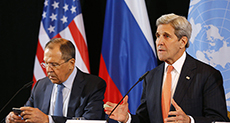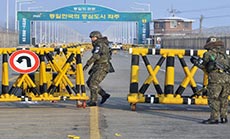Ruling bloc collusion against resistance during war
Source: Al-Manar TV, 14-8-2007
The attempt to liquidate the resistance locally during last year`s "Israeli" aggression against Lebanon was the piled up effort by several political powers in the country. The first indication to this trend was the events that took place during the Khartoum Summit in March 2006, when a fiery dispute broke out between President Emile Lahoud and then Prime Minister Fouad Saniora. Saniora had sought to delete an article in the final statement of the Arab Summit that expresses Arab support to the right of resistance and to gain back occupied lands. This same trend prevailed during the war with much more "open" positions by the so called February 14 political bloc regarding the resistance.
On the 12th of July, the Islamic Resistance announced it had captured two "Israeli" soldiers to make a swap deal and release Lebanese detainees in "Israeli" jails. Hizbullah, on every possible occasion, vowed to capture "Israeli" soldiers; a right given to it by the Ministerial Statement. However, Saniora and his political camp`s swift reaction was to disavow the resistance. Then Information Minister Ghazi Aridi said at the end of a Cabinet meeting that the government was not aware of what was going on and therefore it is not responsible for it. Media outlets also reported that MP Walid Jumblatt said after the resistance`s successful operation was announced that what had happened would open the gates of hell at it, adding that Hizbullah, its allies and even the Syrian regime will pay a heavy price for this. For his part, MP Saad Hariri swiftly threatened to hold whom he called "adventurers" accountable. Speaking to the Saudi Okaz newspaper in September 2006, Hariri said: "The reckless adventurers have embarrassed us." The position of the head of the Lebanese Forces Samir Geagea echoed his allies` adding that the "crisis" should not end with partial solutions, signaling a need to end the case of Hizbullah.
Saniora directed negotiations on behalf of his political team. He admitted conveying letters containing US and "Israeli" demands to the leadership of the resistance. Speaker Nabih Berri and Sayyed Hasan Nasrallah`s political aide Hussein Khalil were negotiating on behalf of the resistance. Khalil was surprised at Saniora`s positions. On one occasion Khalil asked Saniora: "Am I speaking with the Prime Minister of Lebanon or with Olmert?"
Saniora exchanged warm kisses with US Secretary of State Condoleezza Rice in Beirut while "Israel" was committing massacre after massacre across Lebanon with US made bombs. She later met February 14 figures at the US embassy in Awkar. They all had lunch at a time television networks were reporting more devastation and more civilian deaths. Saniora suggested to the Americans that "Israel" return the occupied Shebaa Farms to extract the resistance`s justification to stick to its arms. Saniora also proposed reviving the 1949 armistice agreement and adopted, to a large extent, Washington`s calls to have multinational forces in south Lebanon. At the Rome Conference, Saniora said that weapons should be limited to Lebanese authorities. He even called, during a meeting with Berri and Khalil, for the resistance to hand over their arms or give details about their location so as to confiscate them. Saniora did not achieve his goals and the resistance triumphed, however conspiracies against it are still ongoing. This year, Saniora again proposed at the Riyadh Arab Summit to delete all expressions that show support to the resistance, something he failed to do because of President Lahoud`s position.

Kerry to Hold Fresh Talks with Russia on Syria
8 years ago
All but 4 Nations are Subject to NSA’s Espionage
10 years ago
Koreas Agree to Re-open Kaesong Industrial Zone
11 years ago
